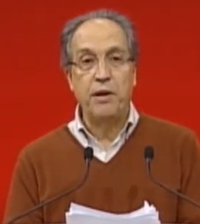Our website is made possible by displaying online advertisements to our visitors.
Please consider supporting us by disabling your ad blocker.
2001 Portuguese local elections
| |||||||||||||||||||||||||||||||||||||||||||||||||||||
All 308 Portuguese municipalities and 4,260 Portuguese Parishes All 2,044 local government councils | |||||||||||||||||||||||||||||||||||||||||||||||||||||
|---|---|---|---|---|---|---|---|---|---|---|---|---|---|---|---|---|---|---|---|---|---|---|---|---|---|---|---|---|---|---|---|---|---|---|---|---|---|---|---|---|---|---|---|---|---|---|---|---|---|---|---|---|---|
| Turnout | 60.1% | ||||||||||||||||||||||||||||||||||||||||||||||||||||
| |||||||||||||||||||||||||||||||||||||||||||||||||||||
Local elections were held in Portugal on 16 December 2001. The elections consisted of three separate elections in the 308 Portuguese municipalities, the election for the Municipal Chambers, whose winner is automatically elected mayor, similar to first-past-the-post (FPTP), another election for the Municipal Assembly and a last one for the lower-level Parish Assembly, whose winner is elected parish president. This last was held separately in the more than 4,200 parishes around the country.
The Social Democratic Party (PSD) won the elections by a landslide, defying polls in many cities across the country in particular the three main cities, Lisbon, Porto and Sintra.[1] The victory of the PSD in these local election was the first since 1985, the last time the PSD won more mayors than the Socialists, although in 1997, the PS and PSD basically tied in number of elected mayors. The PSD won 11 of the 20 district capitals mainly Lisbon, won by Pedro Santana Lopes, and Porto, won by Rui Rio, plus many suburban cities like Sintra, Cascais, Vila Nova de Famalicão and Penafiel swung also to the Social Democrats.
The Socialist Party (PS) was the biggest loser of these elections. After 6 years in power governing without an absolute majority and adding to this a bad economy, the PS hopes of maintaining the largest number of mayors were slashed. The defeat was worse than expected because of loses in the main cities of Lisbon and Porto, where polls showed the PS with a solid lead. Because of the bad results of the party and a prospect of political instability, Prime Minister António Guterres resigned on election night stating that the country should not fall in "a political swamp".
The election was also very bad for Democratic Unity Coalition (CDU) in which they achieved their worst result in local elections till that date. The Communist-Green alliance lost 13 mayoral races plus 37 councillors and lost big cities like Évora and Loures to the PS. The People's Party also had a poor showing losing 5 cities, although this time they celebrated more coalitions with the PSD. On the other hands, the election returns were quite good for other smaller parties: the Left Bloc (BE) won 1 city (Salvaterra de Magos) from CDU and the Earth Party won Celorico da Beira from the PS. Independent movements were also allowed to run in these elections for the first time and won 3 cities.
Turnout in these elections remained unchanged in comparison with the 1997 election, as 60.1 percent of the electorate cast a ballot.
After these elections, a snap general election was called for March 2002.
- ^ Público (22 December 2001). "O povo contra as sondagens". Público (in Portuguese). Retrieved 31 July 2021.
Previous Page Next Page





